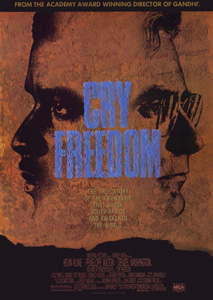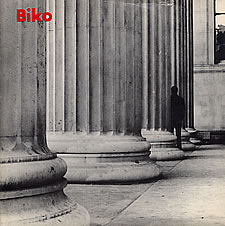Related Research Articles

Bantu Stephen Biko was a South African anti-apartheid activist. Ideologically an African nationalist and African socialist, he was at the forefront of a grassroots anti-apartheid campaign known as the Black Consciousness Movement during the late 1960s and 1970s. His ideas were articulated in a series of articles published under the pseudonym Frank Talk.
The Truth and Reconciliation Commission (TRC) was a court-like restorative justice body assembled in South Africa in 1996 after the end of apartheid. Authorised by Nelson Mandela and chaired by Desmond Tutu, the commission invited witnesses who were identified as victims of gross human rights violations to give statements about their experiences, and selected some for public hearings. Perpetrators of violence could also give testimony and request amnesty from both civil and criminal prosecution.

Donald James Woods, was a South African journalist and anti-apartheid activist. As editor of the Daily Dispatch, he was known for befriending fellow activist Steve Biko, who was killed by the police after being detained by the South African government. Woods continued his campaign against apartheid in London, and in 1978 became the first private citizen to address the United Nations Security Council.

Cry Freedom is a 1987 epic apartheid drama film directed and produced by Richard Attenborough, set in late-1970s apartheid-era South Africa. The screenplay was written by John Briley based on a pair of books by journalist Donald Woods. The film centres on the real-life events involving South African activist Steve Biko and his friend Donald Woods, who initially finds him destructive, and attempts to understand his way of life. Denzel Washington stars as Biko, while Kevin Kline portrays Woods. Cry Freedom delves into the ideas of discrimination, political corruption, and the repercussions of violence.
The Black People's Convention (BPC) was a national coordinating body for the Black Consciousness Movement of South Africa. The BPC was active in the Anti-Apartheid Movement from its establishment in 1972 until its banning in late 1977.
Robert Motherwell was an American abstract expressionist painter, printmaker, and editor. He was one of the youngest of the New York School, which also included Willem de Kooning, Jackson Pollock, and Mark Rothko.

Mamphela Aletta Ramphele is a South African politician, an activist against apartheid, a medical doctor, an academic and businesswoman. She was a partner of anti-apartheid activist Steve Biko, with whom she had two children. She is a former vice-chancellor at the University of Cape Town and a onetime managing director at the World Bank. Ramphele founded political party Agang South Africa in February 2013 but withdrew from politics in July 2014. Since 2018, she is the co-president of the Club of Rome
Gerard Sekoto, was a South African artist and musician. He is recognised as a pioneer of urban black art and social realism. His work was exhibited in Paris, Stockholm, Venice, Washington, and Senegal, as well as in South Africa.
The Black Consciousness Movement (BCM) was a grassroots anti-Apartheid activist movement that emerged in South Africa in the mid-1960s out of the political vacuum created by the jailing and banning of the African National Congress and Pan Africanist Congress leadership after the Sharpeville Massacre in 1960. The BCM represented a social movement for political consciousness.
[Black Consciousness'] origins were deeply rooted in Christianity. In 1966, the Anglican Church under the incumbent, Archbishop Robert Selby Taylor, convened a meeting which later on led to the foundation of the University Christian Movement (UCM). This was to become the vehicle for Black Consciousness.

"Biko" is an anti-apartheid protest song by English rock musician Peter Gabriel. It was released by Charisma Records as a single from Gabriel's eponymous third album in 1980.

William Kentridge is a South African artist best known for his prints, drawings, and animated films. The latter are constructed by filming a drawing, making erasures and changes, and filming it again. He continues this process meticulously, giving each change to the drawing a quarter of a second to two seconds' screen time. A single drawing will be altered and filmed this way until the end of a scene. These palimpsest-like drawings are later displayed along with the films as finished pieces of art.

Frank Chikane is a South African civil servant, writer and cleric. He is a member of the African National Congress and moderator of the Commission of the Churches on International Affairs for the World Council of Churches (WCC).
Berni Searle is an artist who works with photography, video, and film to produce lens-based installations that stage narratives connected to history, identity, memory, and place. Often politically and socially engaged, her work also draws on the universal emotions associated with vulnerability, loss and beauty.

Alexander "Skunder" Boghossian was an Ethiopian-Armenian painter and art teacher. He spent much of his life living and working in the United States. He was one of the first, and by far the most acclaimed, contemporary Black artists from the African continent to gain international attention.
Nigel Gibson is a British activist, a scholar specialising in philosophy and author whose work has focussed, in particular, on Frantz Fanon. Edward Said described Gibson's work as "rigorous and subtle". He has been described as a leading figure in Fanon scholarship.

Biko is a biography about Black Consciousness Movement leader and anti-apartheid activist Steve Biko. It was written by the liberal white South African journalist Donald Woods, a personal friend of Biko. Donald Woods was forced into exile for attempting to expose the truth surrounding Biko’s death. It was the inspiration for the 1987 film Cry Freedom.

Judith Mason born Judith Seelander Menge was a South African artist who worked in oil, pencil, printmaking and mixed media. Her work is rich in symbolism and mythology, displaying a rare technical virtuosity.
Aelred Stubbs was an Anglican priest and monk, influential in the campaign against apartheid in South Africa during the 1970s.

The apartheid regime in South Africa began in 1948 and lasted until 1994. It involved a system of institutionalized racial segregation and white supremacy, and placed all political power in the hands of a white minority. Opposition to apartheid manifested in a variety of ways, including boycotts, non-violent protests, and armed resistance. Music played a large role in the movement against apartheid within South Africa, as well as in international opposition to apartheid. The impacts of songs opposing apartheid included raising awareness, generating support for the movement against apartheid, building unity within this movement, and "presenting an alternative vision of culture in a future democratic South Africa."

Victor Gordon is a visual artist born in South Africa. Gordon is primarily a painter and sculptor. He also creates installations assemblages, collages, drawings and photographs.
References
- ↑ Knell, Simon (2016). National Galleries. Routledge. p. 108. ISBN 978-1317432425 . Retrieved July 26, 2016.
- ↑ Enwezor, Okwui; Okeke-Agulu, Chika (November 30, 2009). Contemporary African Art Since 1980 (PDF). Damiani. pp. 46–7. ISBN 978-8862080927.